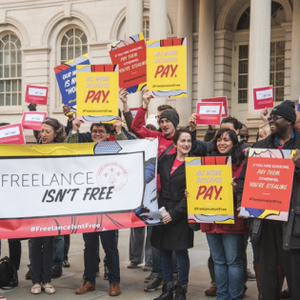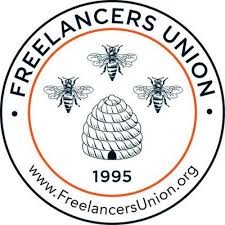Tomorrow – May 15, 2017 – will be a great day for New York freelancers: the day Freelance Isn’t Free Act will go into effect. The Act, the first of its kind in the US, provides basic protections for freelance work. On October the 27th, 2016, in fact, New York City became the first city in the United States to protect freelance workers against client nonpayment. A few weeks later, on November the 16th, Mayor Bill de Blasio signed it into law, starting the 180 days countdown until it goes into effect.
Everything started in September 2015 with the Freelance Isn’t Free Act Campaign launch. Over the course of the following year, freelancers across the city shared nonpayment stories, met with Council Members and stood together at City Hall to spread awareness about client nonpayment.  Over 8.000 freelancers signed the Freelance isn’t free petition to push the bill to vote and, in the end, the act passed with 51 votes.
Over 8.000 freelancers signed the Freelance isn’t free petition to push the bill to vote and, in the end, the act passed with 51 votes.
The law is very important because it’s the first of its kind in the US and it will serve as a national model for protecting freelance workers for all the states; 55 million Americans freelance across the country (about one third of the entire workforce) and almost 40% workers in NYC.
But what does the law say? It establishes and enhances protections for freelance workers, «specifically, the right to written contract, the right to be paid timely and in full, and the right to be free of retaliation. The bill would create penalties for violations of these rights, including statutory damages, double damages, injunctive relief and attorney’s fees».
Thanks to the law, now freelancers who are owned over $800 of work during a four month period must have a written contract listing «the scope of work, rate, method of payment and the payment due date». This because «a contract is the foundation for a great working relationship».
The payment, and this is one of the most important things accomplished by the law, must be received within 30 days of work completion or by the date specified in the contract.  Clients can’t ask freelancers to settle for a smaller but sooner payment, and if they refuse to provide a contract they can face a $250 penalty. If payment is not received, then freelancers can file a court action and receive up to double as damages in case of a win. That’s not all: clients who repeatedly fail to abide with the rules, may also be subject to civil penalties up to 25,000 dollars.
Clients can’t ask freelancers to settle for a smaller but sooner payment, and if they refuse to provide a contract they can face a $250 penalty. If payment is not received, then freelancers can file a court action and receive up to double as damages in case of a win. That’s not all: clients who repeatedly fail to abide with the rules, may also be subject to civil penalties up to 25,000 dollars.
The Freelance Isn’t Free Act would also «require the Office of Labor Standards to receive complaints, create a navigation program and to gather data and report on the effectiveness of the law».
The intent of the law is to protect freelance workers in NYC, but today many freelancers work with remote clients. In this case, «if the client’s office is located outside of NYC, and most of their business takes place outside of NYC, they may not be subject to the requirements of the new law».
But Freelancers Union is working on it: they have launched a new petition to bring the Freelance Isn’t Free Act across the nation, and they already received the support of more than 10k freelancers. They are also working to innovate new ways to get freelancers the health care they need.  Sara Horowitz, founder and executive director of Freelancers Union, Currently the Chair of the Board of the Federal Reserve Bank of New York, founded the nonprofit Freelancers Union in 2003. She promotes the needs of the independent workforce through advocacy, education and serving the needs of the freelancers. «The freelance workforce is growing and independent workers are emerging as a powerful economic and political force», says Horowitz illustrating the “Freelancing in America”, the most comprehensive study of the independent workforce, published on October 2016.
Sara Horowitz, founder and executive director of Freelancers Union, Currently the Chair of the Board of the Federal Reserve Bank of New York, founded the nonprofit Freelancers Union in 2003. She promotes the needs of the independent workforce through advocacy, education and serving the needs of the freelancers. «The freelance workforce is growing and independent workers are emerging as a powerful economic and political force», says Horowitz illustrating the “Freelancing in America”, the most comprehensive study of the independent workforce, published on October 2016.
The study analyzes the growing freelance economy, which in 2016 contributed $1 trillion dollars to the US economy. In spite of this, freelancers still fight with income instability, debt, access to affordable healthcare, late or nonpayment. However the annual study commissioned by Freelancers Union and Upwork shows most freelancers do it by choice: they don’t miss a traditional employment. They are able to work less than 40 hours per week and they feel respected and excited to start each day.
According to the Freelancing in America 2016 survey, 55 million Americans are freelancing, but official statistic from the Bureau of Labor Statistics is missing. BLS first examined gig workers in a 1995 survey and did it again in 1997, 1999, 2001 and 2005. Now, after 12 years since the last survey, the U.S. Department of Labor is funding a one-time update to the survey in May 2017. What is for sure, gig workers affect occupations in many different groups, as arts and design, computer and information technology, media and communications, constructions and extractions, comprising many different types and work across all industries.
The Freelancing in America 2016 report shows that, in spite of everything, the outlook for independent workers is positive. People started freelancing more by choice than necessity. Half of freelancers says there’s no amount of money that would get them to take a traditional job and stop freelancing, not only because of the freedom and flexibility they can have, now, but also because they feel more empowered, respected and motivated than ever before.
The days of a nine-to-five job are almost gone. With freelancers making a huge part of the US economy, and thanks to the Freelancer Isn’t Free Act, now they will also have more protections for their work. At least in New York City. There’s still a long way to go, but what Freelancers Union is doing it’s the first step of a long journey that will probably extend to other big cities in the US. And that many other freelancers all around the world should take as a model.
Marianna Lepore
Foto rettangolare di Geralt da Pixabay in modalità creative commons
Community